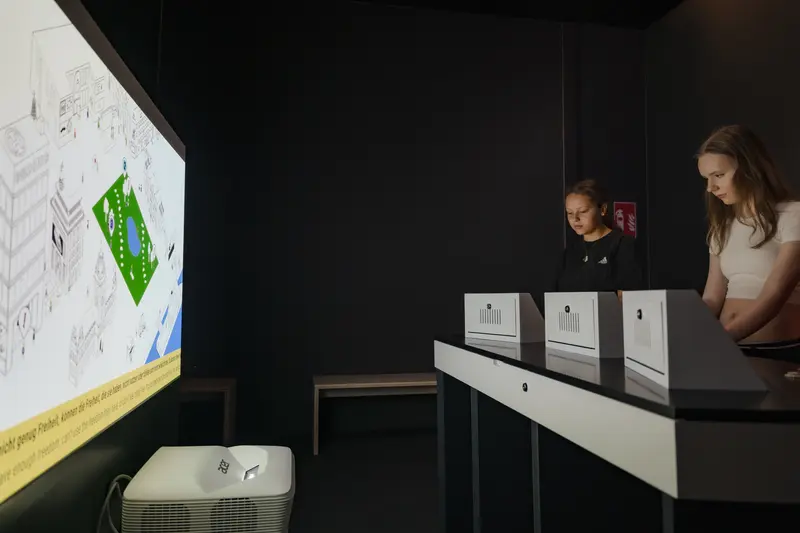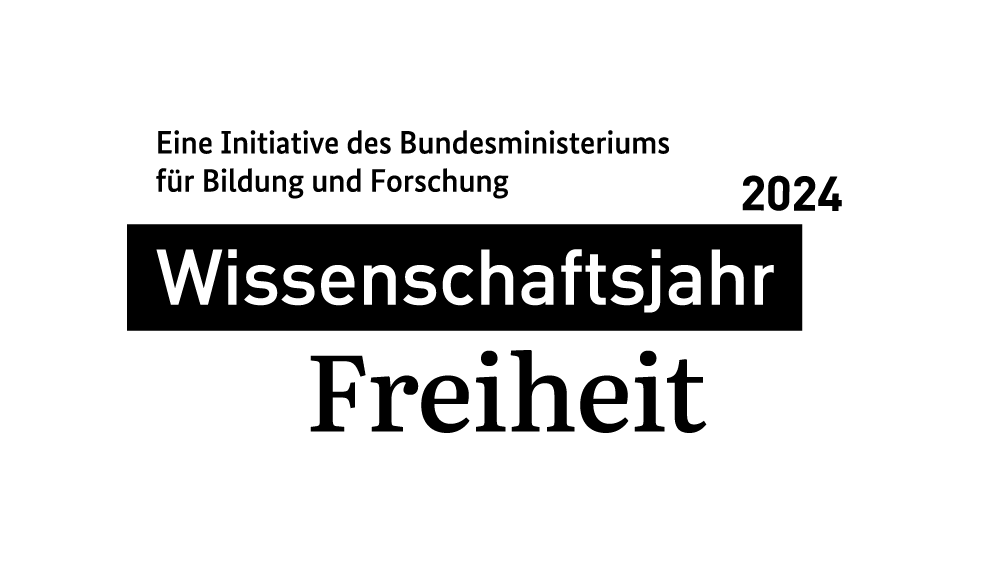Virtual Exhibition Tour
A look inside the exhibition
There are endless ways to explore freedom. You can discover some of them in the exhibition. If you would like to have a look at the themes of the exhibition in advance, you can find information about the exhibits here.
You can download the exhibit texts here.
1 . The Art of Freedom – Experimental fields in words and images
What does art have to do with freedom? Can art contribute to a liberal society by questioning existing ways of seeing and thinking or by introducing new ones? When art encounters censorship, does it fight back or is it destroyed? What roles do images of freedom or unfreedom play in different societies? What does it mean when images are used for propaganda purposes, for example? By the same token, how do visual strategies of resistance function? A number of artistic genres, such as architecture, performance and film, play a role in addressing these questions, as do different concepts of freedom. Our examples illustrate the complex relationship between art and freedom and the importance of viewing images critically.
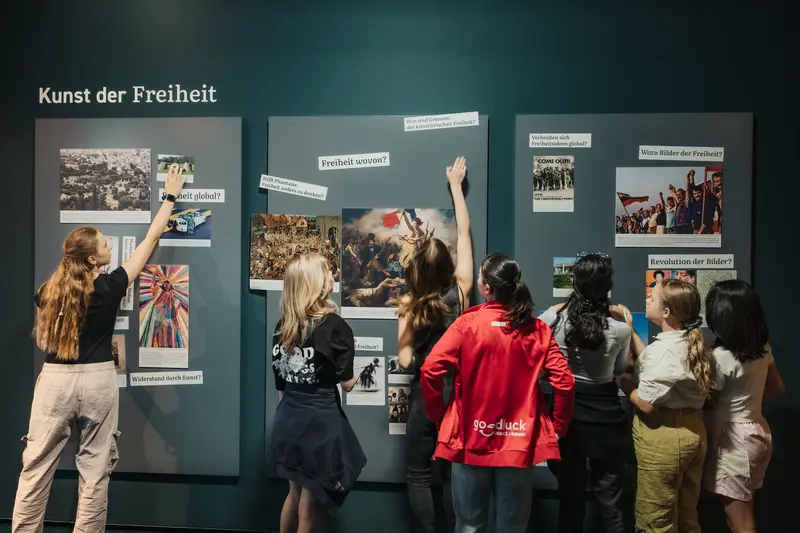
2 . Unboxing Freedom – Stories of freedom from all over the world
Freedom takes many different forms. Personal freedom in particular is closely linked with individual perceptions. We have collected a number of different experiences of freedom in our “Suitcase of Freedom”.
The exhibit is inspired by the intercultural Summer School “Flying Classroom”, which brings together architecture students at HTWG Konstanz – University of Applied Sciences and students from partner universities all over the world. Take a look in the suitcase to discover all the different kinds of freedom our participants experienced during their travels and to see freedom through the eyes of a variety of people. You can also add your own ideas about freedom to the suitcase and hence become part of the diverse freedom narrative as it embarks on a journey around the world.
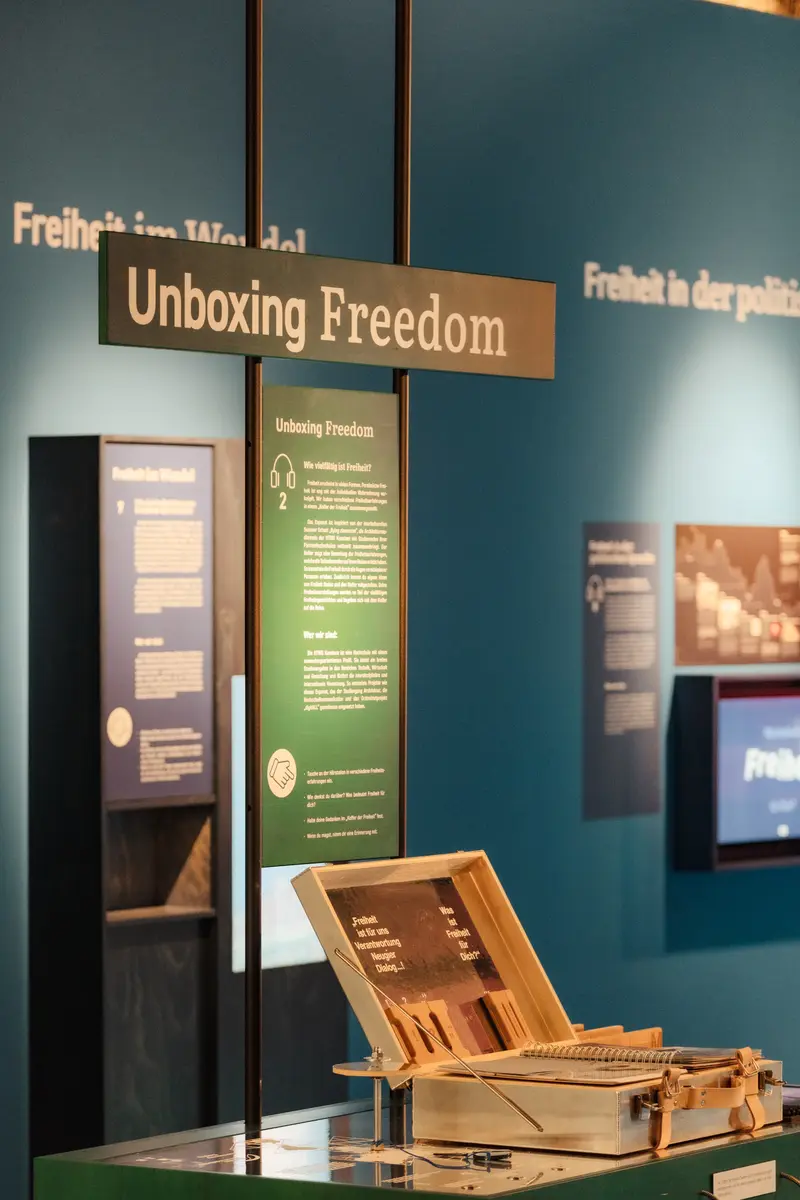
3 . The Tricky Question of Free Will – How free are we to decide?
The assumption that we are free to make our own decisions is fundamental to our coexistence as a society, but brain research is now calling this assumption into question. Researchers set out to investigate where our perception of being free to decide comes from.
Most people assume that they make decisions consciously. What is more, they think that they make those decisions before acting. External influences are not supposed to play a role in the process. But how can we determine the precise moment at which we make a conscious decision? And can we really tell when we are being influenced by external factors and when we are not?
Try doing these two experiments to find out how well you can determine whether you are making a conscious decision and whether your decision is influenced by external factors.
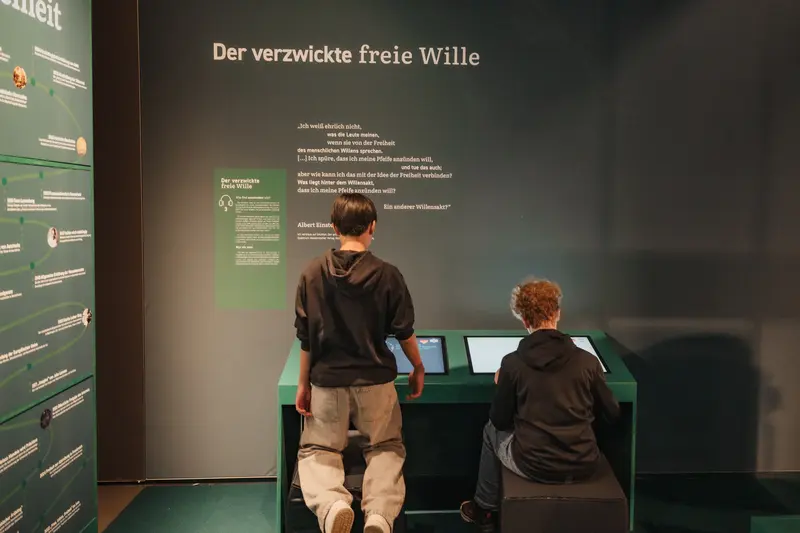
4 . Two Sides of the Same Coin – Podcasts about freedom and responsibility
In the words of singer Marius Müller-Westernhagen, “Freedom is the only thing that counts.” It’s a statement that is just as relevant now as it was back then – life without freedom is simply unbearable for a lot of people. But what exactly is freedom? How do scientists define freedom, and how do they study all its various forms and aspects? What does freedom mean for us, for our state governed by the rule of law, and for our individual liberty?
In seven podcasts produced together with the podcast platform detector.fm, scientists from the Max Planck Society discuss their understanding of freedom and responsibility.
The podcasts focus on political freedom and human rights. You can listen to them at three different audio points located throughout the exhibition.
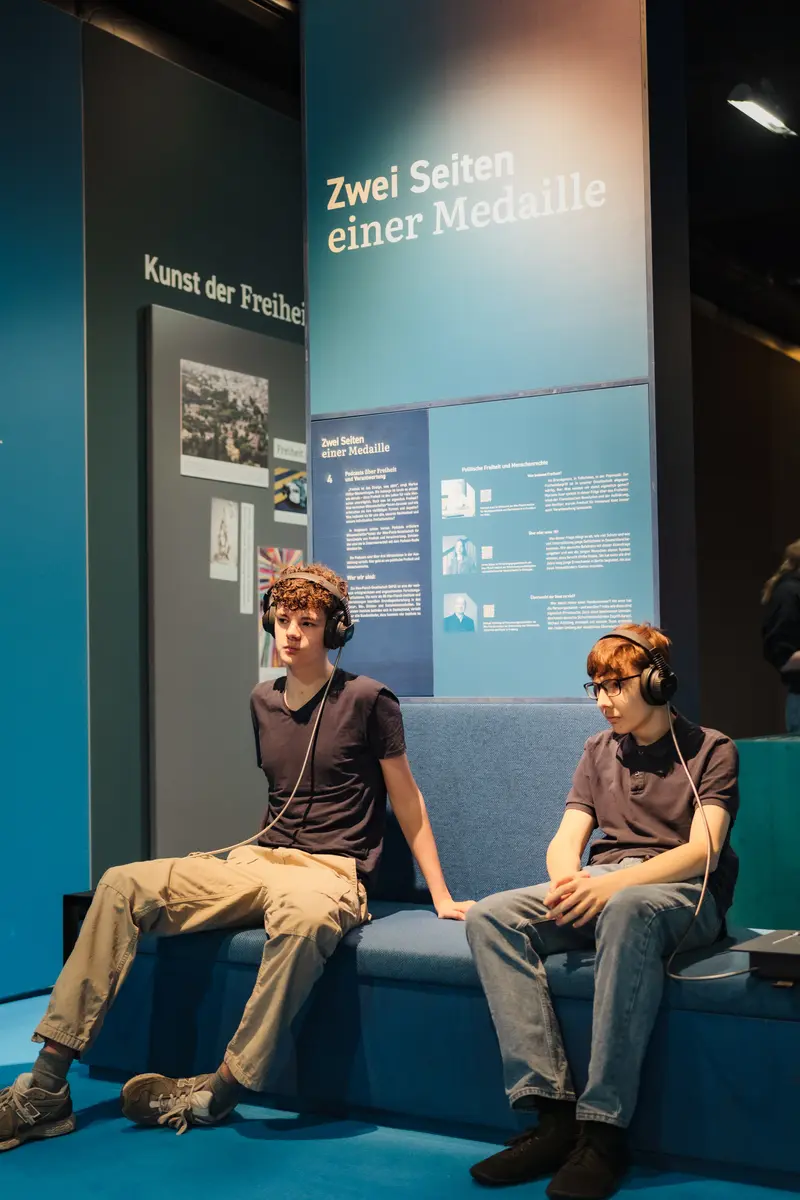
5 . On the Path to Freedom – Striving for freedom in Eastern Europe 1989–1991
The word “freedom” ranks among the defining political bywords of the twentieth century, particularly in Eastern Europe: freedom through national self-determination after 1918, freedom from Nazi occupation after 1945, and, in particular, freedom from post-1945 Soviet domination.
Resistance to the Soviet Union began to form in the 1960s. Perhaps you have already heard of the Prague Spring, the Polish Solidarity movement or the Baltic Way? These various resistance movements eventually culminated in independence for the countries of Eastern Europe. In this interactive application you will learn about the most important locations and stages in these independence movements.
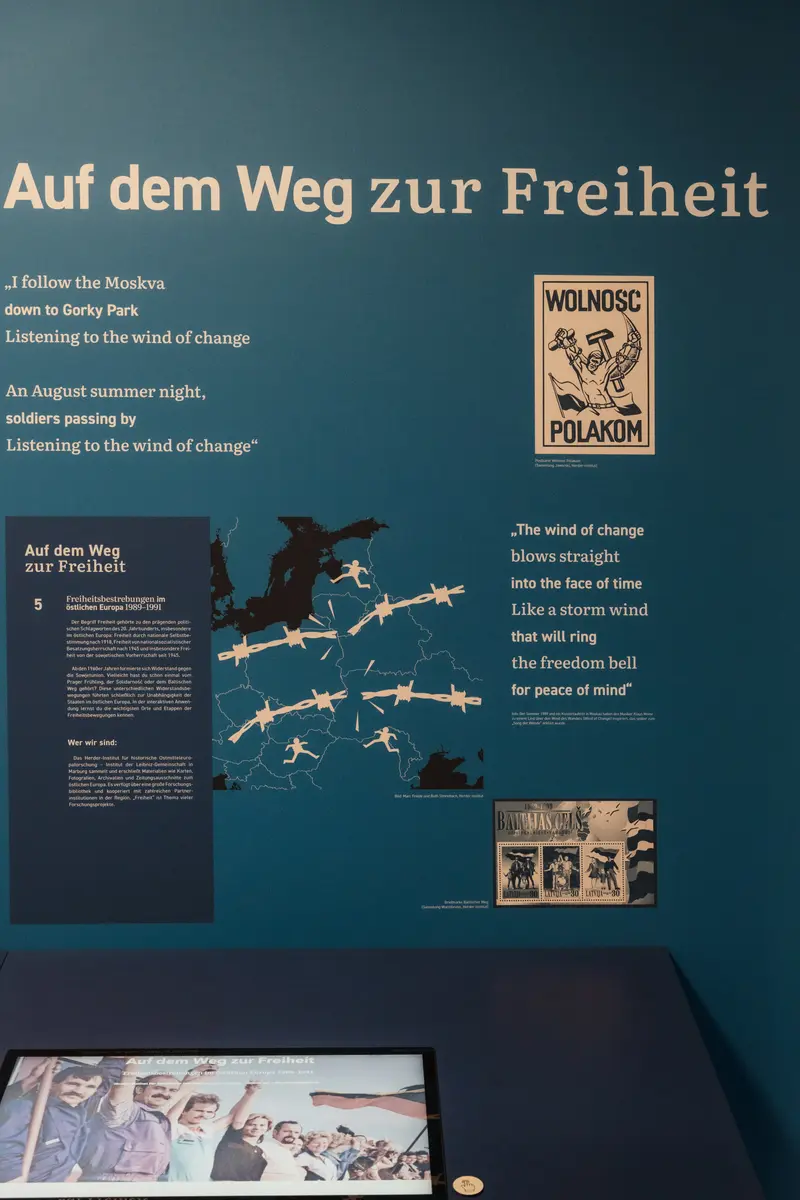
6 . Striving for Freedom – The February 1918 peace treaty with Ukraine
In the eighteenth century the territory of today’s Ukraine belonged to two great powers: western Ukraine was part of the Hapsburg monarchy, while northeastern Ukraine belonged to czarist Russia. So Ukraine was struggling for independence back then, too. Following the October Revolution of 1917 Ukraine was pressing for autonomy even as the First World War was still raging.
By signing a separate peace treaty with the German Reich and its allies, first and foremost Austria-Hungary, Bulgaria and the Ottoman Empire, Ukraine managed to secure its independence on 9 February 1918 – at least for a short time.
It was not unusual for a political event of this kind to be used as a postcard motif. In the late nineteenth century, postcards were used to document and commemorate such events.
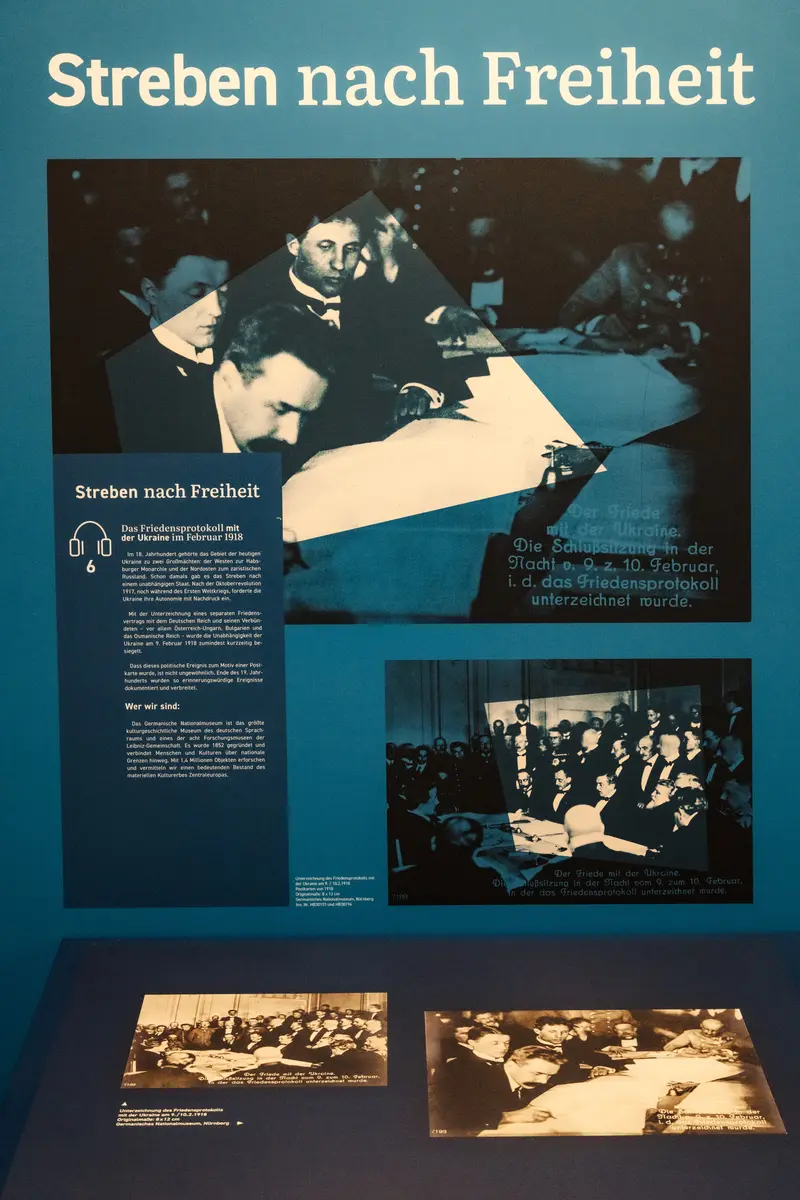
Freedom in Transition – How notions of freedom have changed over time
Freedom is not a fixed notion but rather an idea that is constantly changing. In the Middle Ages and the Early Modern period, “freedoms” were privileges that were closely connected to social status. High-ranking individuals had more freedoms than other people, and the prevailing laws in each region determined who benefitted from freedoms and to what extent. The notion of freedom as something to which all (male) citizens were entitled did not emerge until the eighteenth century, while female citizens had to wait much longer than that.
In this quiz you can test your knowledge of historical concepts of freedom. You will learn how people viewed freedom in the German-speaking world from the Middle Ages to the recent past. You can also find out in which periods independence struggles played a particularly important role.
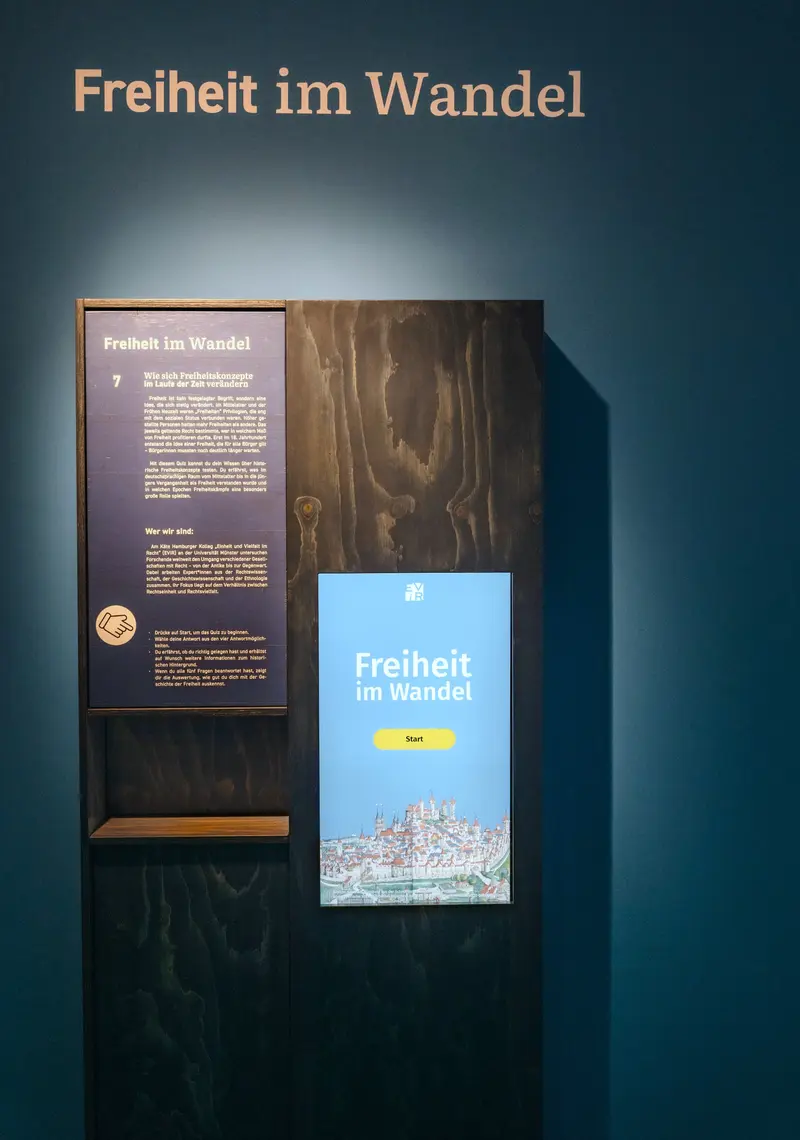
8 . Freedom in the Language of Politics – How freedom is understood by politicians and society
When we hear the word “freedom” each of us imagines something different. At this exhibit you can examine your own idea of freedom and learn how it is connected to everyone else’s. How is the notion of freedom used by politicians and society? Is our idea of freedom different from that of twenty years ago?
These are questions being addressed by linguists, among others. We focus on language – sometimes employing computer-assisted techniques – and develop theories concerning how terms like “freedom” are used in different contexts.
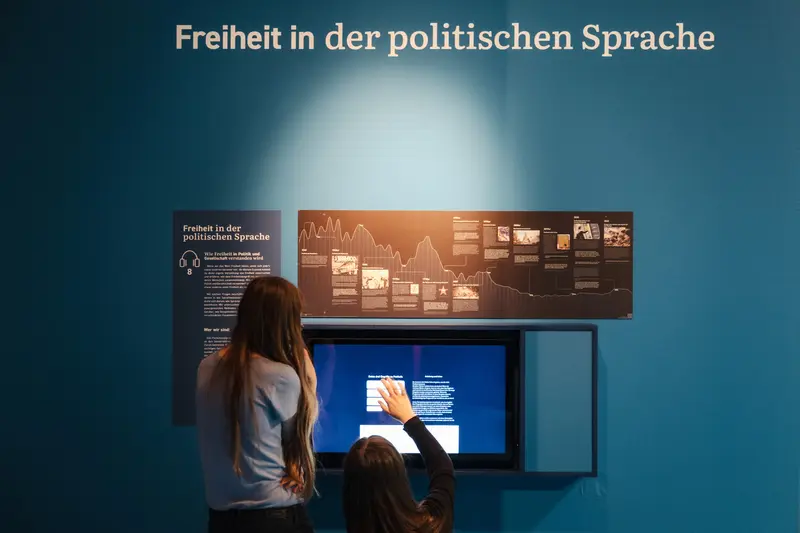
9 . Unfreedom and Insecurity in Colonial History – How maps influence our view of the world
Freedom, peace, security: these were the things the European powers promised in order to legitimise their domination of ever larger parts of the world. Yet the reality in the conquered territories was quite different: the colonies were scenes of war, repression, exploitation and forced displacement. Resistance was punished with renewed violence. Freedom and security for some meant unfreedom and insecurity for others.
These contradictions are not visible on the maps, which depict just one way of looking at the world – just one reality among many. In this exhibit you will learn why maps were used by the colonial countries as powerful instruments of repression and yet at the same time served to criticise this reality.
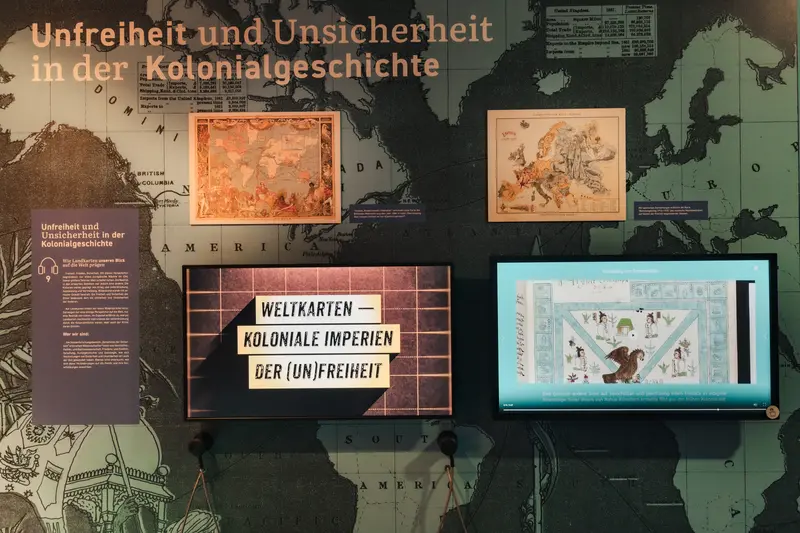
10 . Genetic Pinball – The interaction between genes and society
The belief is still very widespread that either our genes or our environment determine what kind of human beings we become. In fact, though, we can only understand human development if we look at the complex interaction between our genetic make-up and social structures. One example of this is academic achievement, which is influenced both by genetic factors and by our family and school environment. Our game shows how this interaction can influence not just our school career but also our health, for example.
As a society we are free to reshape social structures. What would you change? And what impact will these changes have as they interact with our genes?
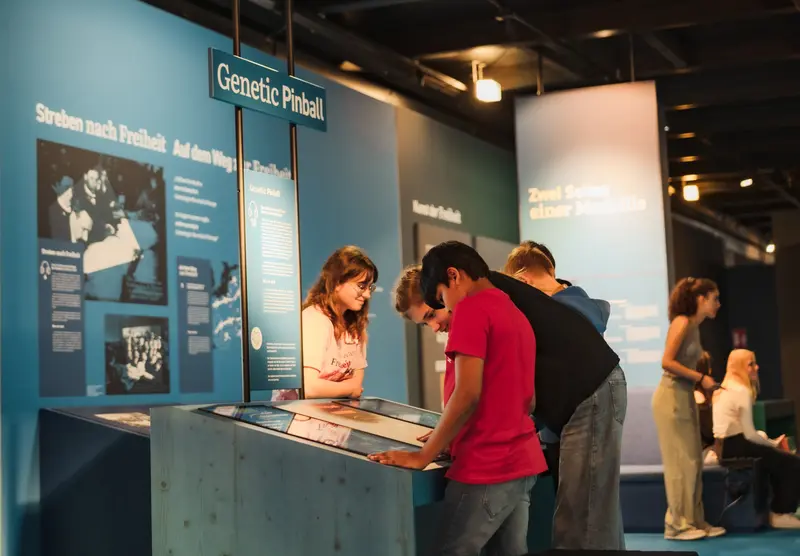
11 . Just Ask! – Digital interviews as a way of communicating history
The number of people able to recount their experiences of the Nazi era first-hand is steadily decreasing, which is why we decided to spend five days interviewing and filming two of them – Inge Auerbacher and Kurt S. Maier. This exhibit invites you to hear some of their 900 answers, and you can even ask some questions of your own with the aid of artificial intelligence, either online or in the exhibition Just Ask!
You will hear how Inge Auerbacher and Kurt Salomon Maier were deprived of their rights and discriminated against and how they escaped from the Nazis. They also talk about how these experiences continue to affect them to this day. Their answers show just how important our fundamental democratic rights are.
Many of the persecuted sought to ship their property to the countries that offered them asylum. We have adopted this motif for our installation.
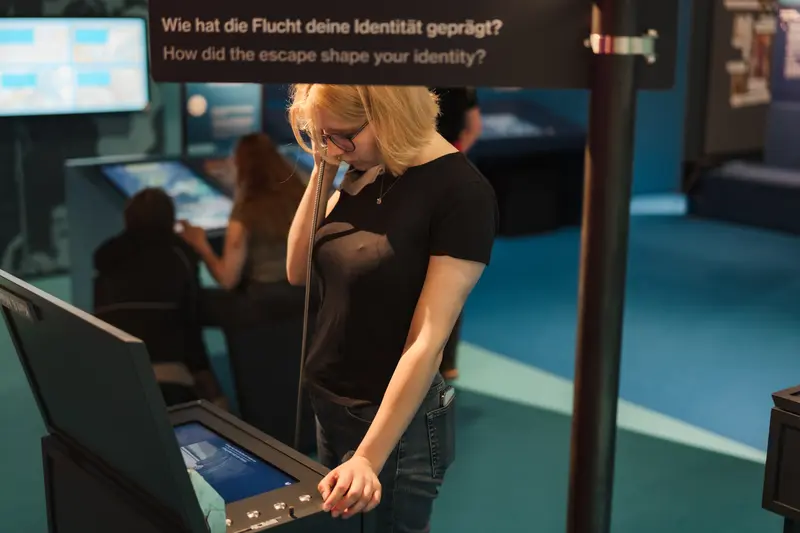
12 . Art as Protest – How creatives fought for freedom in the GDR
In around 1960 members of the US Mail Art movement began sending artistically designed letters and postcards by post. In the GDR this form of art – known locally as “Fenster zur Welt” (Window on the World) – was also very popular with opponents of the regime. Sending Mail Art was a highly risky business[MN1] , since the Ministry for State Security (Stasi) regularly monitored the post.
Artists’ magazines were also officially prohibited in the GDR, but widespread on the art scene. They were published in very small print runs and often contained critical texts and images.
Music also played a role in opposition to the GDR government. In just a few years the Jazzwerkstatt Peitz developed into a popular meeting point before it was banned by the Stasi.
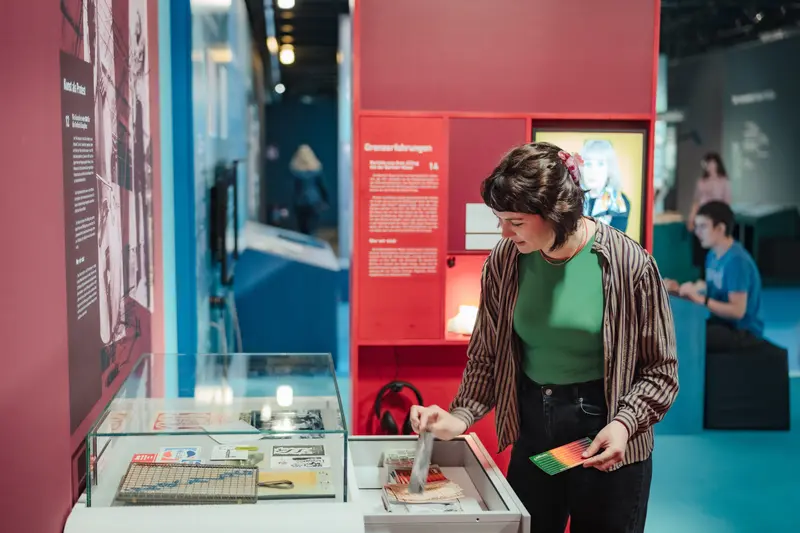
Gutenberg and Democracy – Printing as a trailblazer of free speech
Johannes Gutenberg, who lived from around 1400 to 1468, is considered the father of printing. It was this invention that first made it possible to disseminate texts on a large scale. Before that, every text had to be meticulously copied by hand. Printing led to the explosive spread of knowledge and hence greater freedom of speech – in the form of pamphlets, for example. Gutenberg’s new technology thus prepared the ground for revolutions and democratic movements, which would have been unthinkable without the mass dissemination of the printed word.
The technical wherewithal for printing comprised lead, metal letters, the hand mould, a spoon and the printing press. Today’s digital media allow information to be spread incomparably faster than in Gutenberg’s day, but they are also more susceptible to fake news.
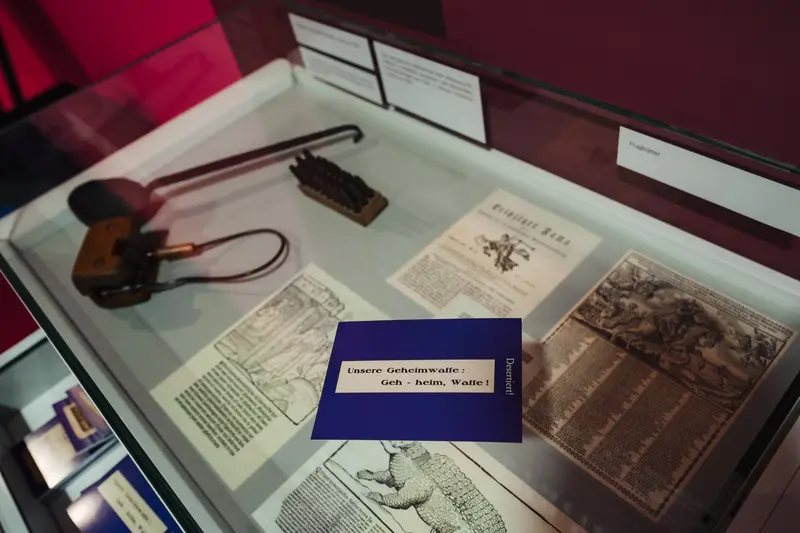
14 . Border Experiences – Living with the Berlin Wall
The Berlin Wall is a powerful symbol of unfreedom. Beginning in 1961, it severely limited freedom of movement for citizens of the GDR. The fall of the Wall in 1989 is now viewed as an act of liberation and symbolised the end of the Cold War.
Museums and media often present the history of the inner-German border as if every East German citizen had asked themselves at some point whether they should stay in the GDR or leave. In fact many of them never even thought in such terms. The GDR was their home, and the Wall was a part of everyday life for the inhabitants of East and West Berlin alike. Many simply came to terms with the border. But what did freedom mean when the Wall was your neighbour? How did people deal with this situation? Here five contemporary witnesses from East and West speak about their different experiences.
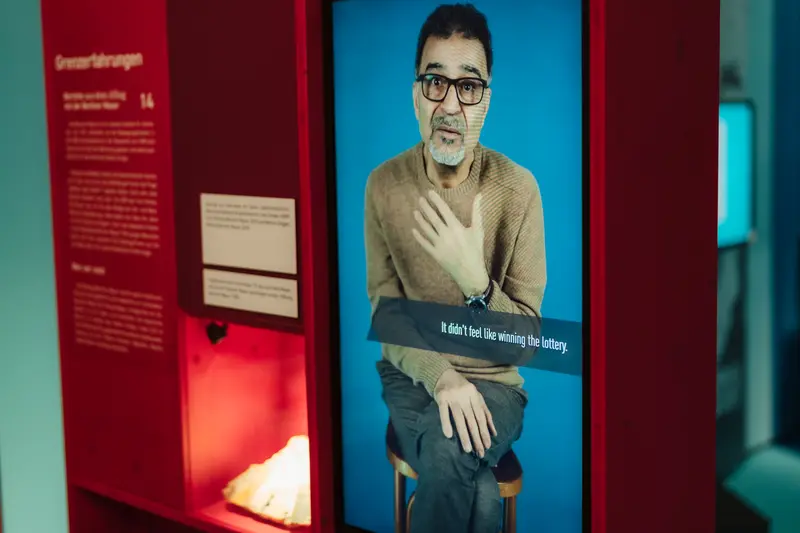
15 . The Parliamentary Compromise – Betrayal or the essence of our democracy?
The members of the Bundestag – the German parliament – spend a lot of time talking, and sometimes they argue as well. One of the jobs of members of parliament is to represent the interests of the people who elected them. Because people have different opinions, they vote for different parties. Each party promises to work in the interests of its voters.
To pass laws in the Bundestag, a majority of its members must vote in favour of them. Often legislation can only be adopted after politicians have found a compromise – between different parties, for example. This means that sometimes parties are not able to hold to their campaign promises 100 per cent.
When this happens, some voters feel they have been betrayed by politicians. However, compromise is essential if the interests of as many people as possible are to be taken into account.
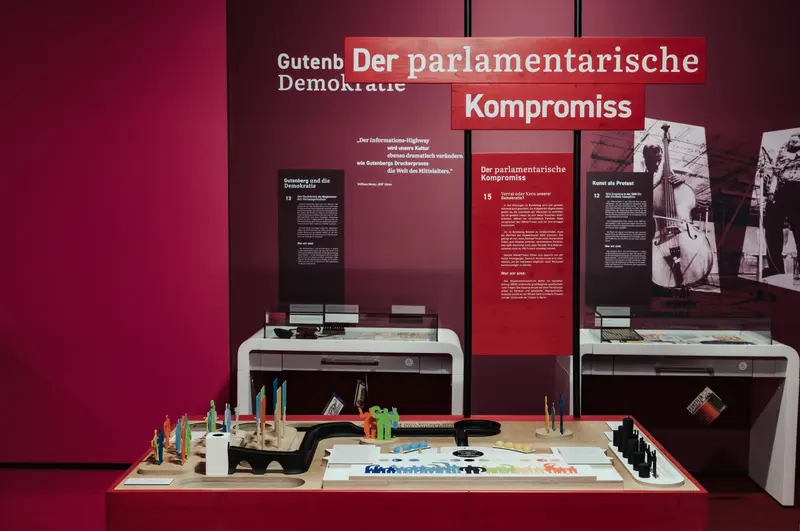
16 . The Book of Freedom – Seventy-five years of the Basic Law – the foundation of our democracy
Our democracy is founded on the Grundgesetz (Basic Law). It enshrines fundamental rights intended to protect the freedom of the individual. It was drawn up seventy-five years ago only four years after the end of the Nazi era, a time in which many people’s freedoms were arbitrarily suspended.
This is precisely why the Basic Law was designed to provide special protection for these fundamental rights – for everybody. It emphasises respect for those with differing beliefs and offers protection from state encroachment. As a look at other parts of the world shows, this is not something we can take for granted: civil rights are violated in many countries.
Societies and the circumstances of those who live in them are constantly changing. For this reason the Basic Law must be constantly adjusted and discussed. This ensures that its provisions remain up-to-date and viable.
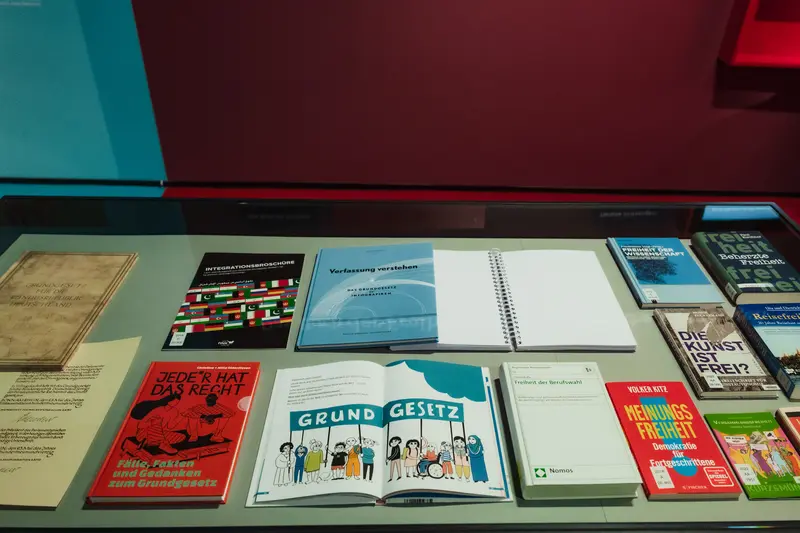
17 . Animal Witnesses – What two giraffes have to do with the Basic Law
The Federal Republic of Germany is celebrating its seventy-fifth birthday this year. On 1 September 1948 the Parliamentary Council convened for the first time in Bonn, at the Koenig Museum of Natural History. The purpose of the meeting was to draw up Germany’s Grundgesetz (Basic Law), which enshrines freedom as a basic human right, and thus provide a foundation for our democracy. At that time there were two stuffed giraffes in the museum atrium. The museum’s founder, Alexander Koenig, had brought them back from South Sudan, then a British colony, in 1913. Other stuffed animals were removed from the room, but the giraffes were too big, so they were concealed behind a long curtain instead.
The seated giraffe – the “silent witness” to the creation of the Grundgesetz – served as a model for the bronze sculpture shown here.
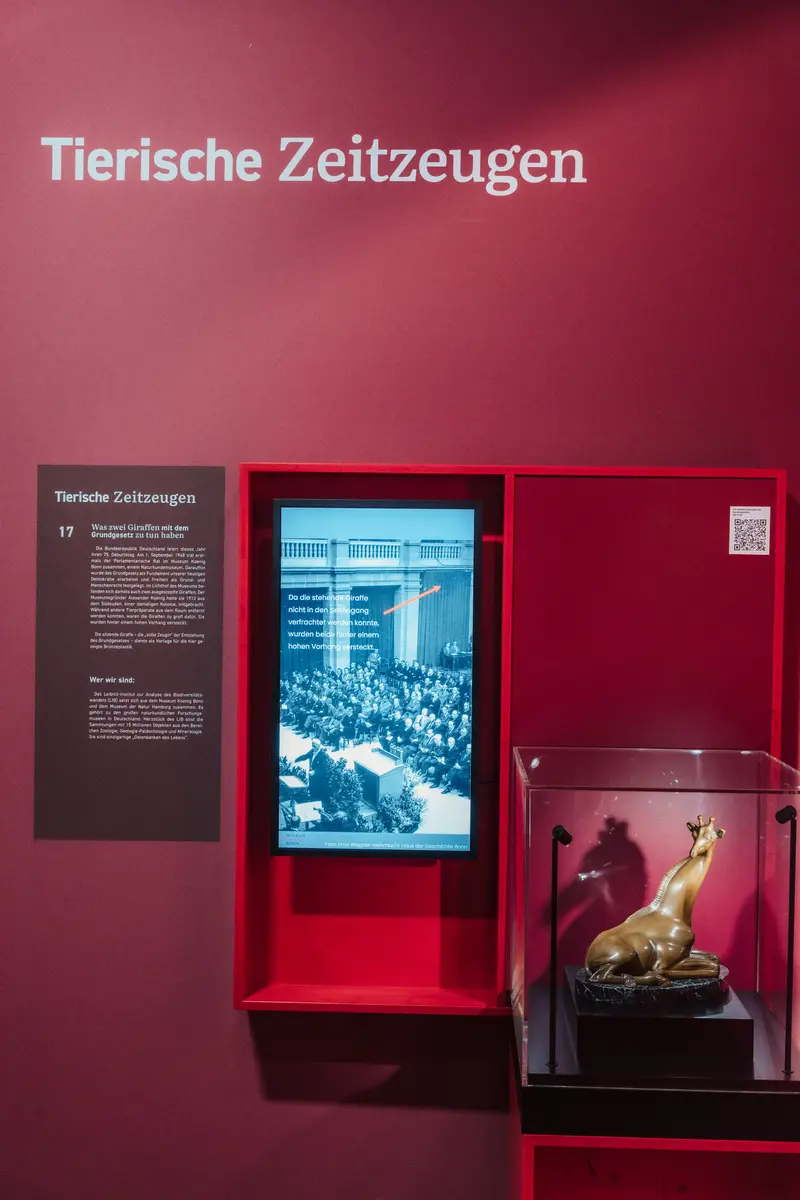
18 . Two Sides of the Same Coin – Podcasts about freedom and responsibility
In the words of singer Marius Müller-Westernhagen, “Freedom is the only thing that counts.” It’s a statement that is just as relevant now as it was back then – life without freedom is simply unbearable for a lot of people. But what exactly is freedom? How do scientists define freedom, and how do they study all its various forms and aspects? What does freedom mean for us, for our state governed by the rule of law, and for our individual liberty?
In seven podcasts produced together with the podcast platform detector.fm, scientists from the Max Planck Society discuss their understanding of freedom and responsibility.
The podcasts focus on political freedom and human rights. You can listen to them at three different audio points located throughout the exhibition.
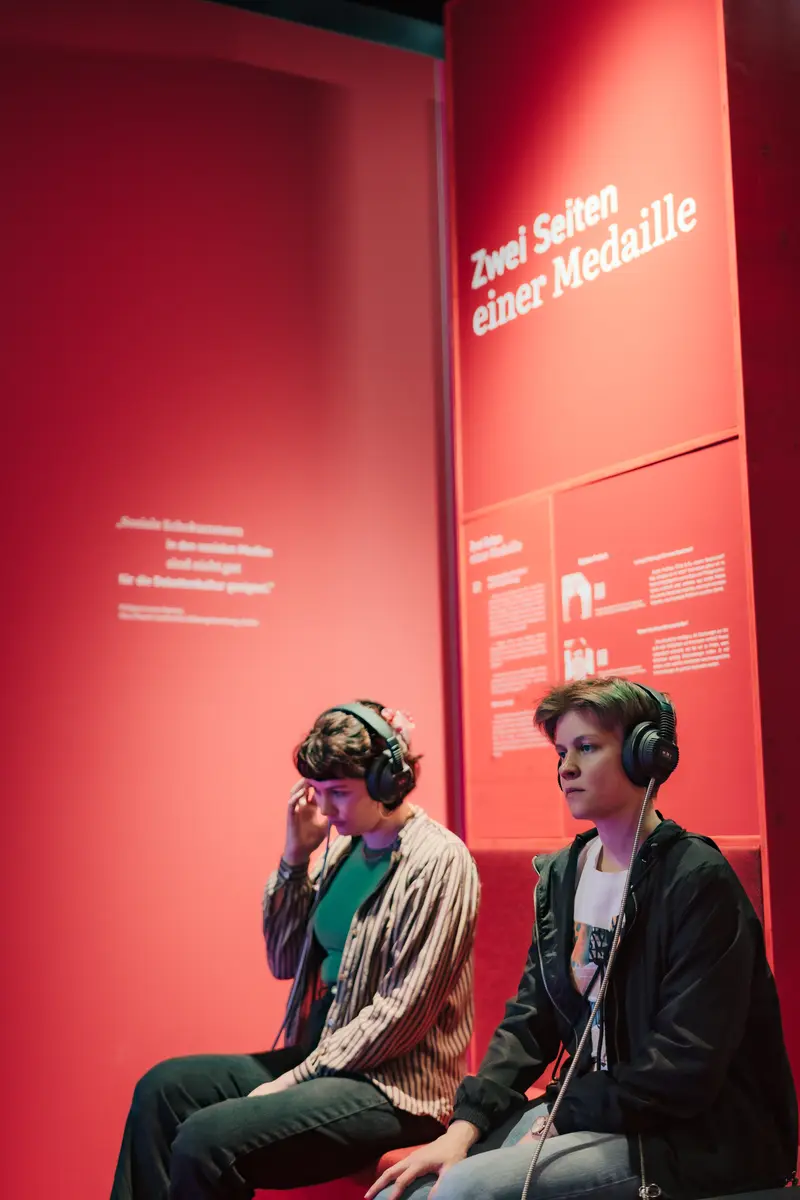
19 . The Globe of Academic Freedom – Where free research is protected – and where it isn’t
The Academic Freedom Index records how free the world’s academics are in their research and teaching. One of the things it assesses is whether a given state and society respect universities as independent institutions. This freedom is important not only for academics but for all the rest of us as well, because independent and quality-assured research makes a valuable contribution to public debates. It enables a free society to progress further.
In our exhibit you can find out how academic freedom has evolved globally since 1900 and the amount of freedom academics in each country enjoy. As you will see, only in democracies is academic freedom truly safeguarded.
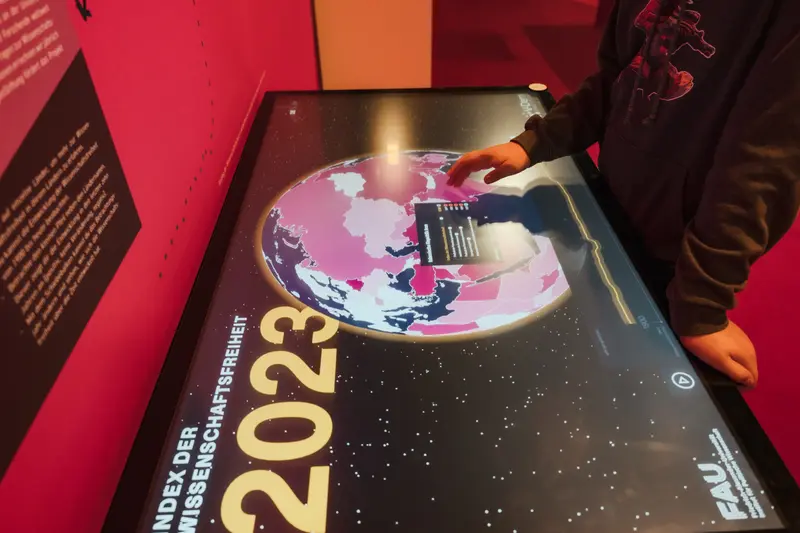
20 . The Free University Berlin – Freedom to study
The Free University (FU) Berlin was founded in West Berlin in 1948, three years after the Second World War ended. At that time Berlin was divided into four sectors, with the three Allies in the West and the Soviets in the East forming two irreconcilable blocs. The political repression and persecution in East Berlin could be clearly felt at Berlin University, so students banded together to found the FU.
At the three audio points in the exhibit “Freedom to Study”, former students, staff and lecturers at the FU talk about what freedom means for them.
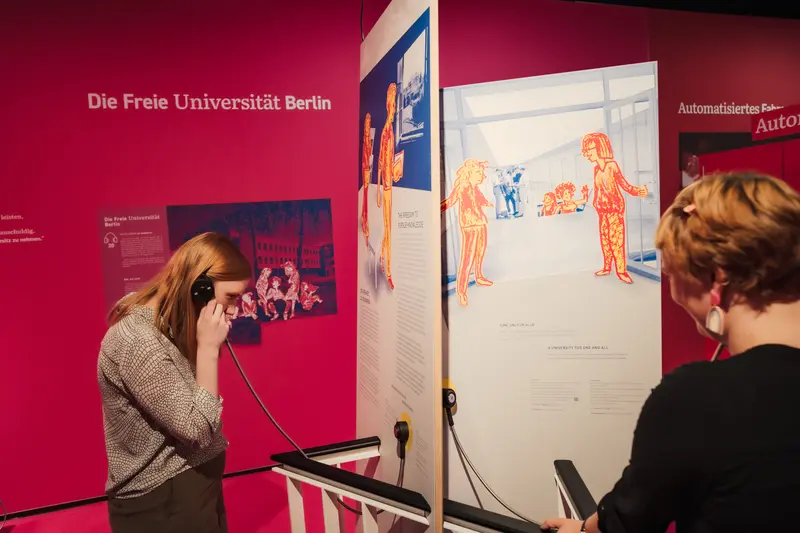
21 . Academic Unfreedom – When researchers are persecuted for their work
Academic freedom needs to be constantly defended. This applies especially to authoritarian systems all over the world, but also to democracies in the heart of Europe. More than half of the world’s population lives in countries where academic freedom is in decline. In many countries it is at a low level, and in only a few has it improved.
For many researchers, following their conviction that teaching and research should be free from fear, dictates and threats comes at great personal risk. For some, the only way out is to leave the country. In our film you can hear some of these researchers talking about their experiences and about what academic freedom means for them personally.
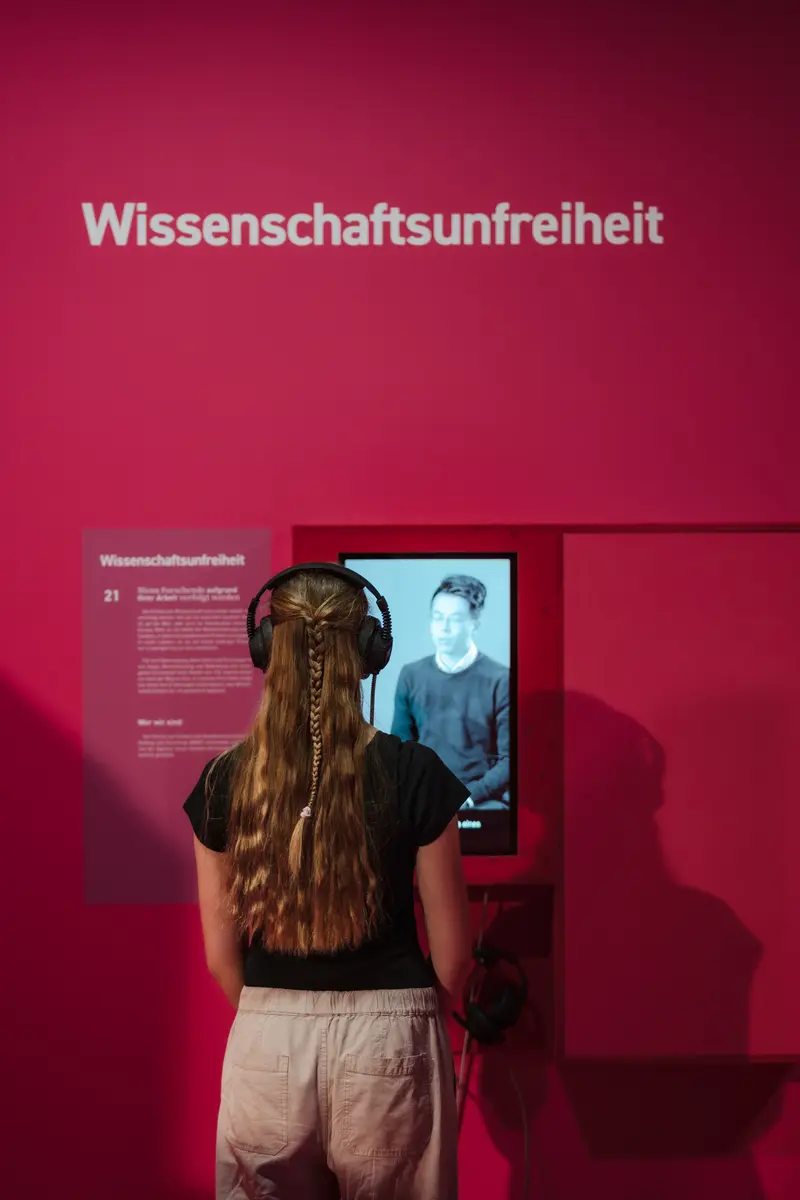
22 . Two Sides of the Same Coin – Podcasts about freedom and responsibility
In the words of singer Marius Müller-Westernhagen, “Freedom is the only thing that counts.” It’s a statement that is just as relevant now as it was back then – life without freedom is simply unbearable for a lot of people. But what exactly is freedom? How do scientists define freedom, and how do they study all its various forms and aspects? What does freedom mean for us, for our state governed by the rule of law, and for our individual liberty?
In seven podcasts produced together with the podcast platform detector.fm, scientists from the Max Planck Society discuss their understanding of freedom and responsibility.
The podcasts focus on political freedom and human rights. You can listen to them at three different audio points located throughout the exhibition.
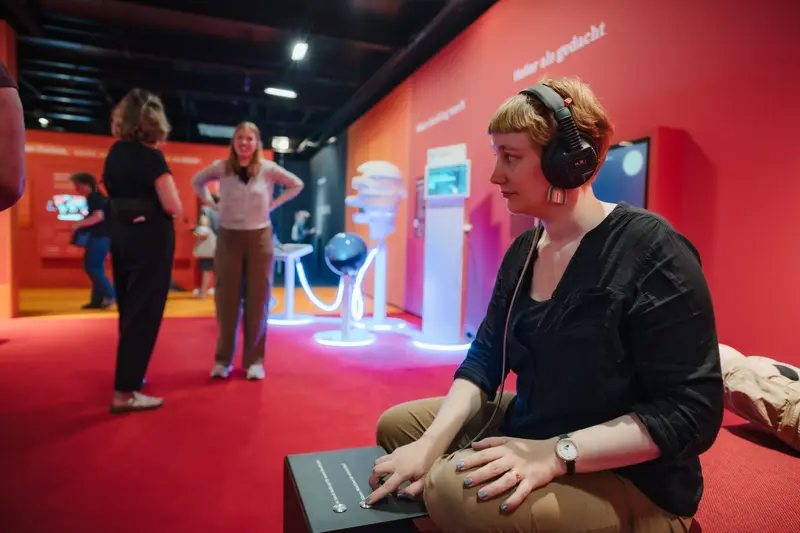
23 . Brighter Than We Imagine – Why the darknet is not all negative
The darknet does not have a good reputation. We often hear about it in connection with criminal activity, but who actually uses it and how? Recent research has revealed that there is a positive side to the darknet as well. In Germany many people use it to surf the internet anonymously and to avoid annoying advertising. Media organisations have their own websites on the darknet that their sources can use without being identified. People who are persecuted in their home countries can use it to exchange news or to organise.
This exhibit allows you to explore the positive aspects of this hidden part of the internet. The comic figure “Naive User” will serve as your guide.
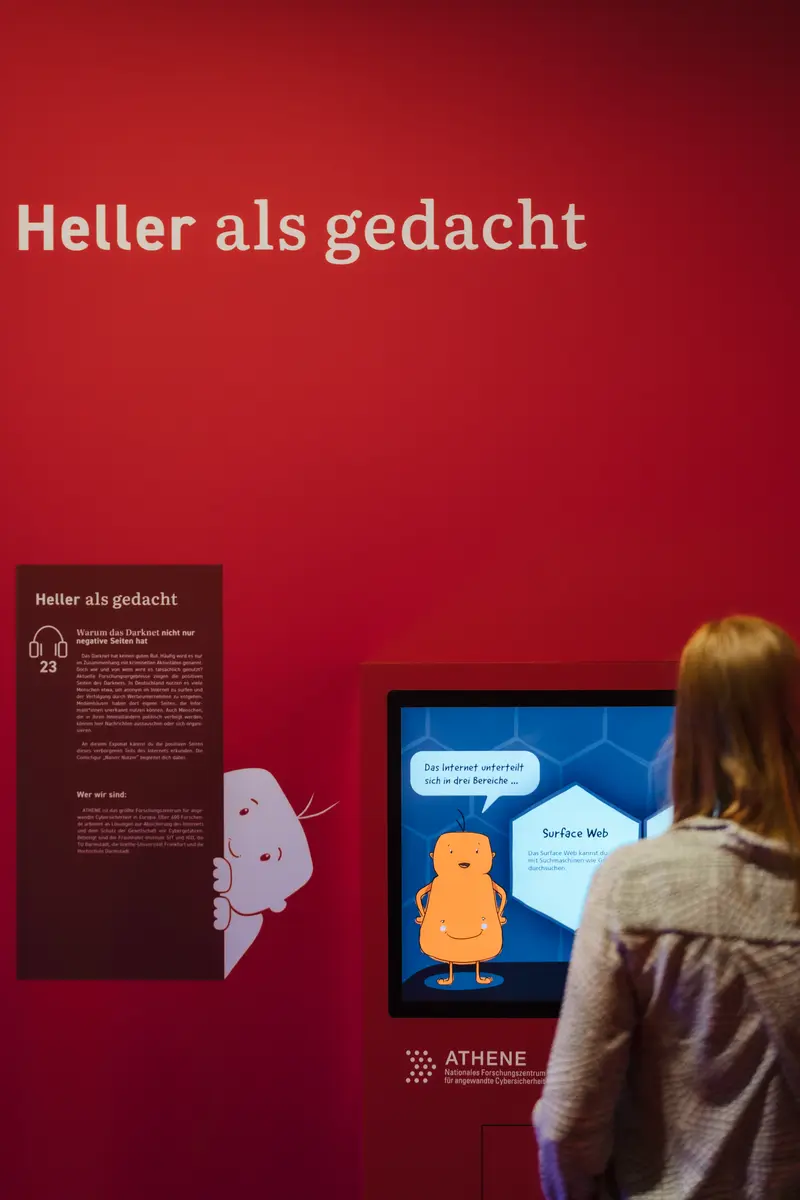
24 . Who’s Deciding Here? – Which decisions can artificial intelligence already make – and which are still out of its reach?
Technologies like artificial intelligence (AI) are increasingly being used in areas where safety and security are paramount. They serve as assistants in autonomous vehicles, in robot production safety monitoring systems, in tools used to identify fake news and as decision-making aids for doctors. But if AI makes the wrong decision, this can have far-reaching consequences. What kinds of decisions will AI systems be able to make in the future and which ones will we want them to make? Can we trust its algorithms when our safety and security are at stake? The exhibit playfully illustrates how AI can help us and where its current limitations lie. Play against AI and put your own freedom to make decisions to the test!
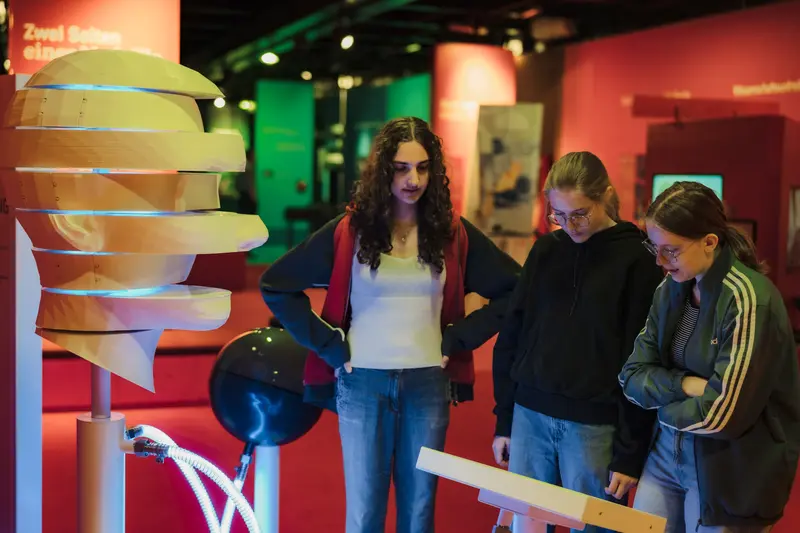
25 . Automated Vehicles – How a technology can influence our understanding of freedom
Driving has changed radically in our age of technological advancements. Today, automated vehicles that require virtually no human control already exist. This technology promises a number of advantages. State-of-the-art sensors combined with artificial intelligence have the potential to reduce traffic jams and accidents and do less harm to the environment. However, it also raises a number of questions: if we relinquish control and let AI do the driving, do we have more or less freedom? Here you can find out for yourself what impact automated driving has on your freedom.
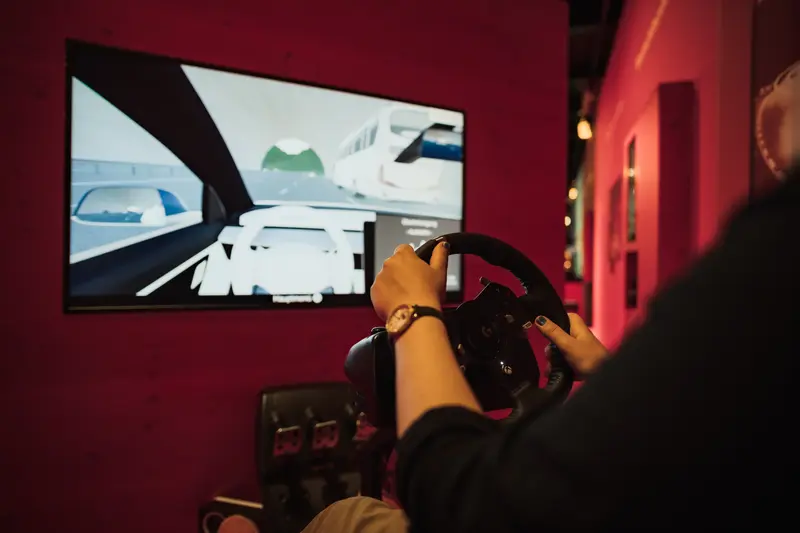
26 . Moral Machines – Can artificial intelligence take moral decisions?
In the future autonomous vehicles will be a normal part of the traffic on our roads. This means that when an accident happens, an algorithm will be making life and death decisions with no human intervention. For example, if a vehicle’s brakes fail, artificial intelligence will decide who is to be saved – the people inside or outside the vehicle?
Using an online experiment we have collected decisions made by more than 80 million people all over the world since 2015. The results reveal differences in moral judgements between cultures and countries.
The experiment invites you to think about the ethical principles built into AI systems and shows how difficult it is to agree on a set of rules for “machine ethics” that can be applied all over the world.
How would you programme AI?
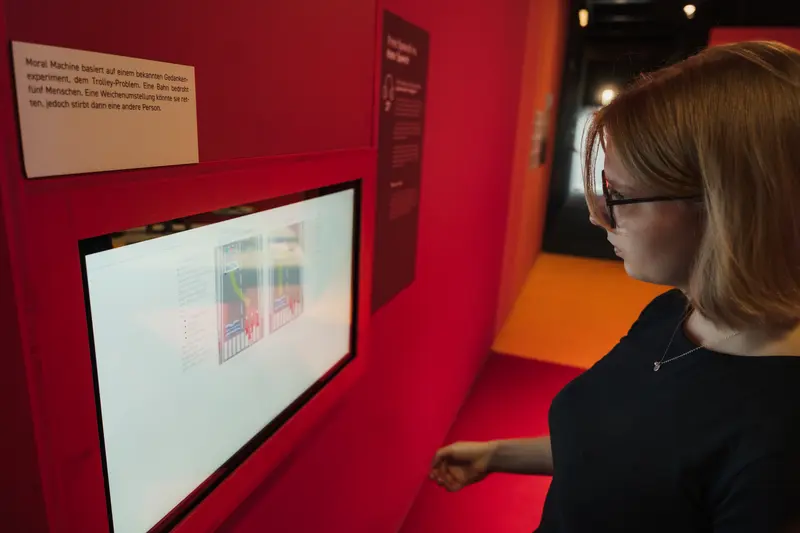
27 . Free Speech vs. Hate Speech – How can basic rights be weighed against one another?
Social media make it easy for everyone to find information and exchange ideas. But the way that hate comments are spread through various platforms is also a major issue. To change this, in February 2024 the European Union (EU) introduced new rules for online platforms. Any content that contravenes laws must be deleted. From a legal point of view the key question is the extent to which free speech should be subject to restrictions. You can use this exhibit to find out for yourself whether the new EU rules are appropriate or whether they violate European basic rights.
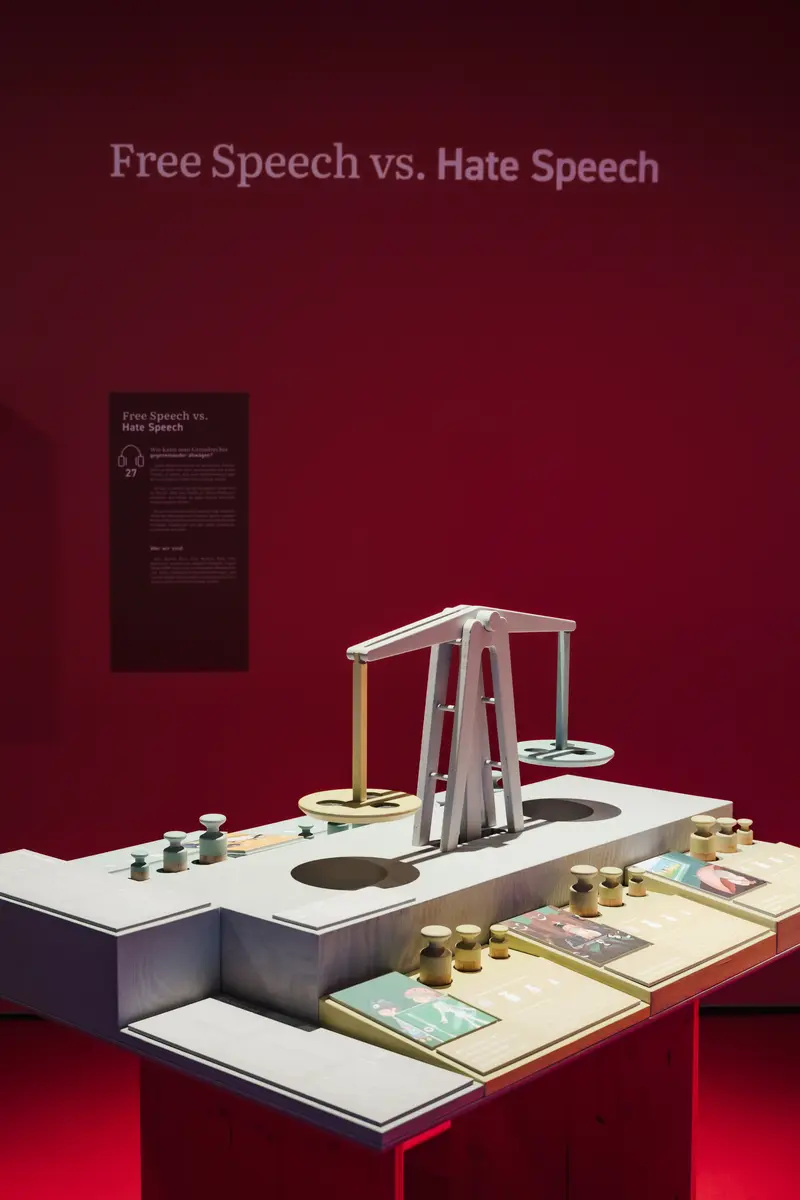
28 . 100 Voices – One Planet – Living with climate change
Climate change affects all of us. Mostly we talk about it in terms of facts and figures, but how do humans experience climate change? To find out we made 100 short videos all over the world which you can watch here. A grandfather in Great Britain is worried about his grandchildren’s future. A student living on a Pacific island hopes that her home won’t be flooded. A farmer in Gambia doesn’t know how much he will be able to harvest if the rain doesn’t come.“100 Voices – One Planet” (100VOP) shows how people like you and I experience climate change. Here you can view a selection of stories from a wide range of people on every continent.
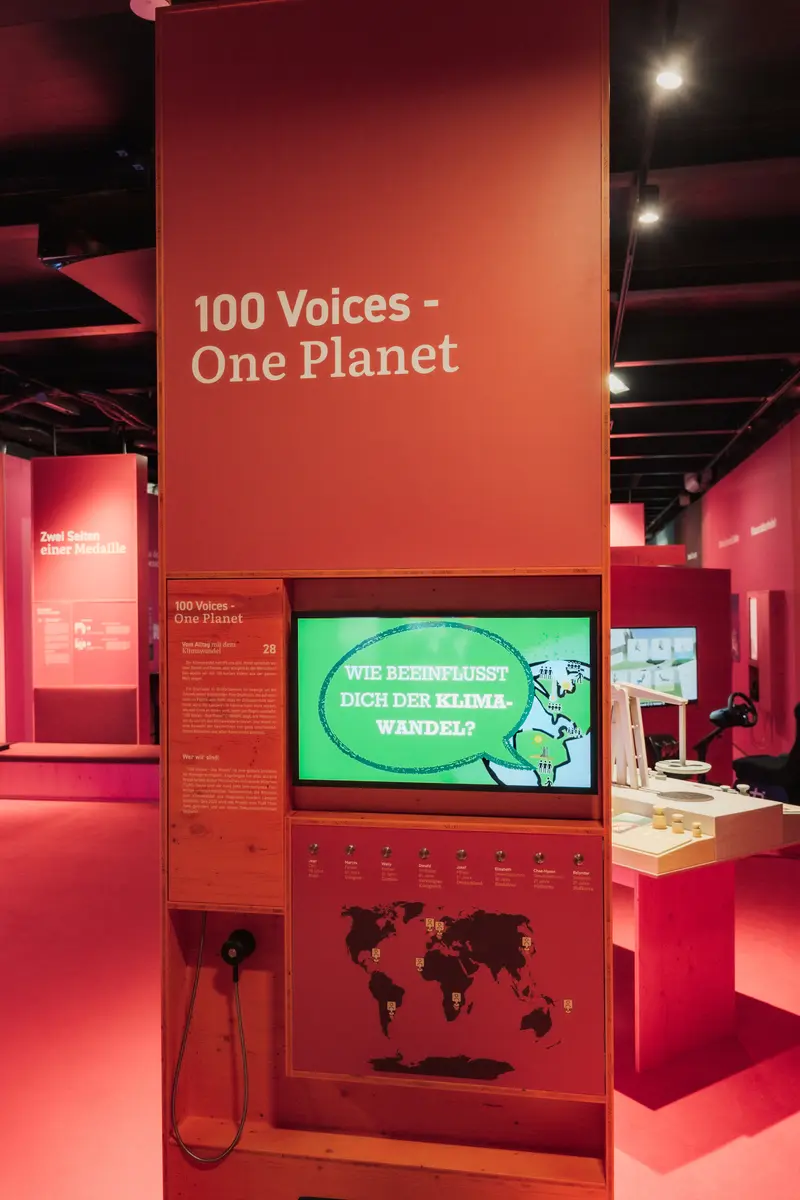
29 . The Freedom Not to Live at Others’ Expense – Why are we letting the climate disaster happen?
The ever-worsening climate disaster constitutes clear evidence of how our lifestyle impacts the planet. Droughts, forest fires, torrential rain and floods are becoming ever more frequent. The fact is that the lifestyle of industrial countries is primarily responsible for climate change. So why aren’t we using our freedom to combat climate change rather than knowingly restricting the freedom of future generations and of people in other regions of the world?
Researchers from various branches of psychology are investigating this question. We’d like to hear your ideas too. How can we better reconcile what we know with how we act as a society?
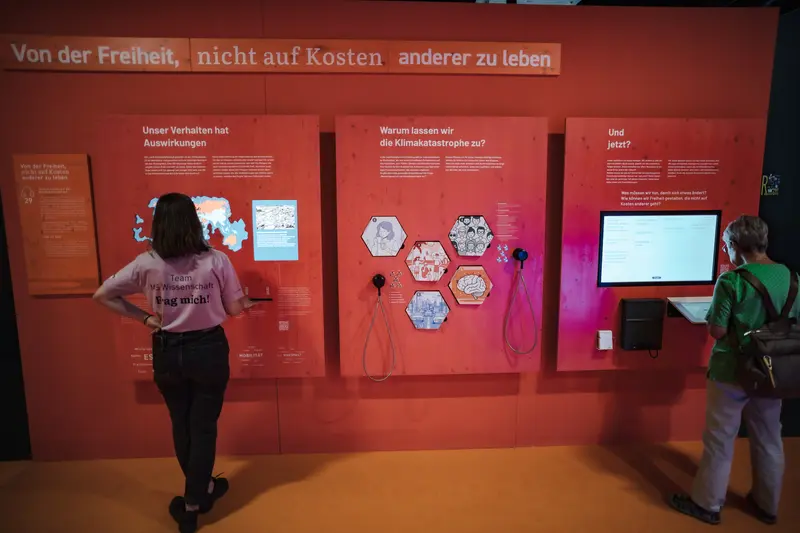
30 . In the Name of Freedom – How do you imagine freedom?
The project “In the Name of Freedom” invites people to meet in various public spaces to discuss the value and meaning of freedom. What are people’s perceptions of freedom? How do they experience it? What kinds of freedom are particularly worthy of protection and which should be critically examined?
On MS Wissenschaft we will collect and document your personal ideas about freedom. All visitors are invited to record their ideas about it in a freedom archive. The contributions to this archive will form the basis for new research projects. Your contribution might even help to change history.
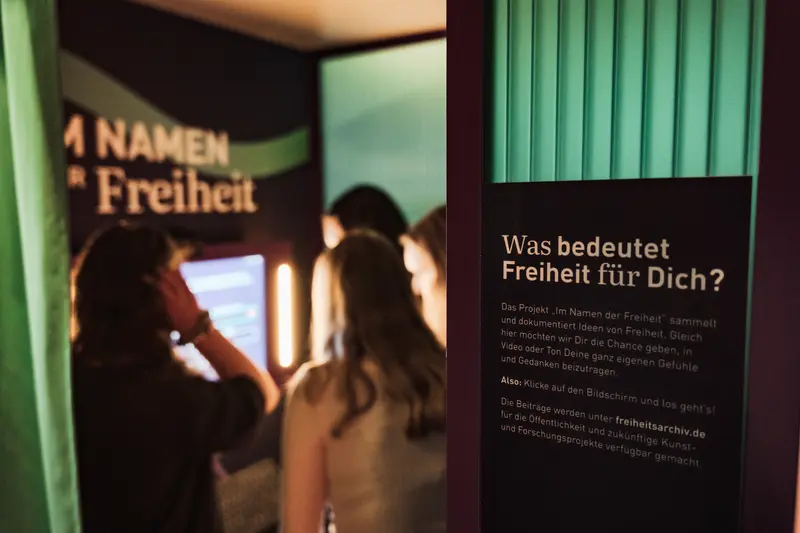
Citizen Quest – Working together for a freer world
In this multi-player game you move through a city where you can learn about all the different kinds of freedom. You meet characters whose freedom is under threat, and your task is to help them by encouraging them, getting them to engage in discussion, providing them with new ideas or simply empathising with them.
Your adventure begins on the mathematics ship, which has docked in the city’s university quarter. Here pioneers of academic freedom are campaigning for research data that are “FAIR”: findable, accessible, interoperable and reusable.
After that you can explore other areas of the city. So off you go to look for topics and aspects of freedom that you have already encountered in the exhibition.
